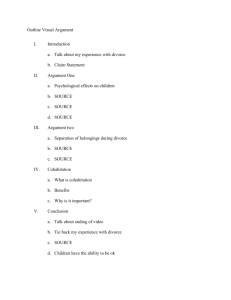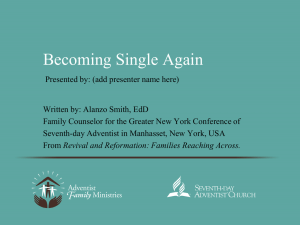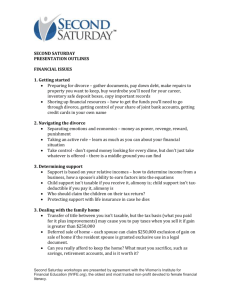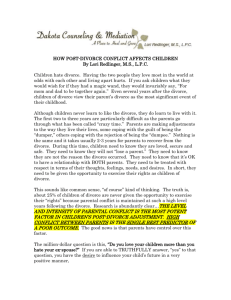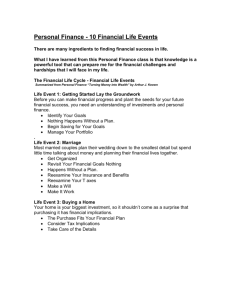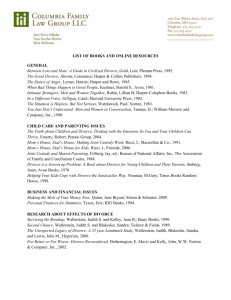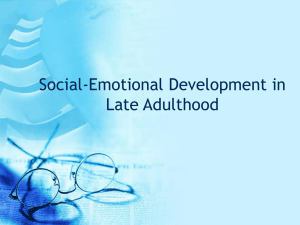The Effects of Divorce on Children and Their Development
advertisement
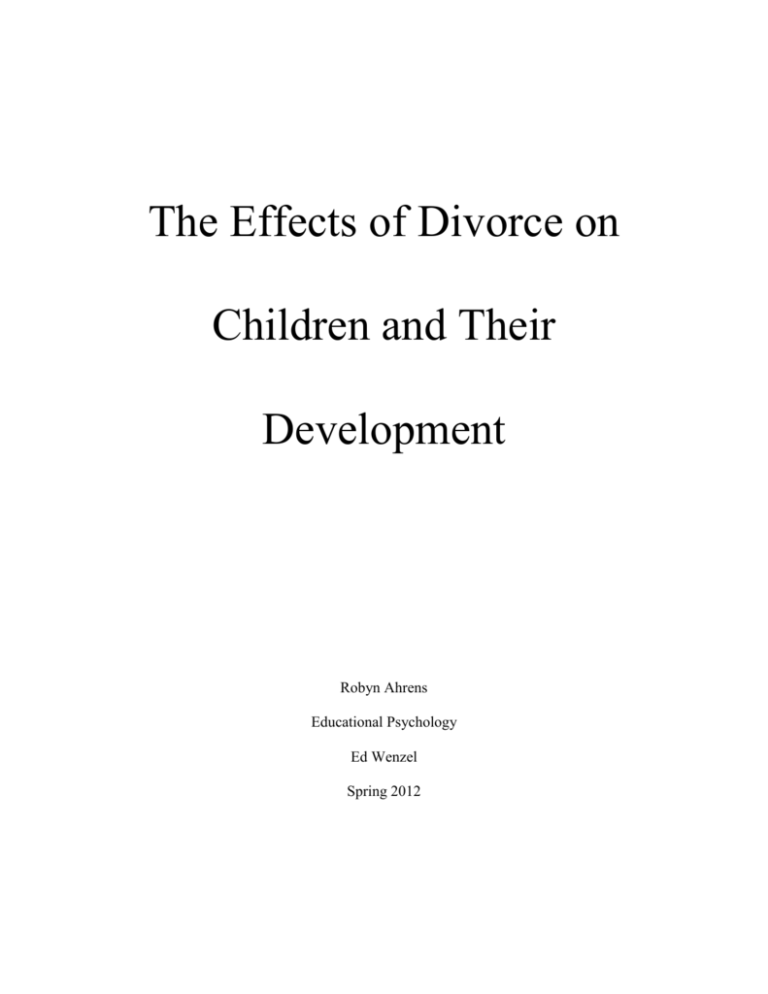
The Effects of Divorce on Children and Their Development Robyn Ahrens Educational Psychology Ed Wenzel Spring 2012 2 Introduction: It is no surprise that divorce happens fairly often these days. Nearly half of all marriages end in divorce, but what does this mean for the children of these separating couples? Does divorce in fact cause any real problems for children and/or their development? Divorce is a serious topic, and it can cause troubling issues with children and their development. It is important to know what these effects are, and how you could deal with them in a classroom. This topic is particularly interesting to me because of how high the rates of divorce are, and I am sure that it will come up sometime in my career as a teacher, and I will have to know how to deal with it and help my students deal with it as well. Also, I have had friends and classmates that have had to deal with the divorce of their parents and I would like to know more about it, so I can maybe relate a little bit more and try to understand a bit of what they were going through. I just feel as though divorce is something I should know more about, to understand what people have gone through, and for future reference with my students when I become a teacher. Review of Literature: Over one million children experience parental divorce every single year (Peterson, 2003), and often the effects are long term (Johnston and Wallerstein, 1990). A child must go from living in a world that feels safe and comfortable, to traveling back and forth between two completely different worlds, when their parents go through a divorce (Peterson, 2003). The age that a child is when their parents get the divorce does make a difference. Children may be affected differently based on their age at the time of their parents’ 3 divorce (Mann, 2011). Also, divorce affects children differently based on the coping mechanisms that they have at the particular stage of development that they are in (Bryner, 2001). Children who are at the preschool age lack the knowledge to understand what divorce entails, so their reactions are typically just confused, but may lead to blaming themselves, due to their egocentrism. However, children who go through parental divorce this young tend to adjust better than children who were older during their parents’ divorce (Amato, 1994). Children at the primary school age can more easily grasp what divorce entails, and understand more what is going on. Feelings of sadness and depression are more common at this age, as well as anger towards one or both of their parents (Amato, 1994). At the adolescent age, the child is less impacted directly by the divorce, but the anger towards one or both parents is still apparent. Adolescents whose parents are going through divorce tend to have concerns and question their own intimate relationships, as well as their ability to maintain long-term relationships (Amato, 1994.) Divorce can be seen as the “easy way out” sometimes. However, what parents may see as a quick way out almost always results in emotional damage that their children will carry for over thirty years (Desai, 2006-2007). Adults who experience parental divorce as a child had lower psychological wellbeing, more behavioral problems, less education, lower job status, a lower standard of living, lower marital satisfaction, a heightened risk of divorce, a heightened risk of being a single parent, and poorer physical health. (Amato, 1994) 4 There are many negative effects that divorce can have on a child, both short term and long term. What a child see’s and experiences during the divorce become a part of their view of themselves (Johnston and Wallerstein, 1990). Children in divorced families, on average, experience more problems and have a lower level of well-being than do children in continuously intact two-parent families. These problems include lower academic achievement, more behavioral problems, poorer psychological adjustment, more negative self-concepts, more social difficulties, and more problematic relationships with both mothers and fathers. (Amato, 1994) One of the specific ways that divorce affects children is academically. Children experience high levels of behavioral problems, which can lead to grades that suffer. Children from divorced families are also less likely to graduate from high school (Desai, 2006-2007). Children of divorce also tend to fall behind specifically in math and social skills, and may also not be able to catch up with their classmates (Mann 2011). Aside from academic consequences of divorce, there are many others. Up to 25% of children with parents of divorce have serious social, emotional, and psychological problems that last long term (James, 2002). Children may also experience feelings of anxiety, sadness, and low self-esteem (Mann, 2011). One specific way that divorce can affect a child is economically. Studies show that the outcomes of children whose families go through divorce are related to the income of the family after the divorce (Amato, 1994). Having a decline in income increases the risk of psychological and behavioral problems that children may face, and also could affect their nutrition and health (Amato, 1994). The parent with whom the child lives 5 with after the divorce, often has to live off of just their income, which is why children of divorced families are more almost five times more likely to live in poverty than children who have married parents (Desai, 2006-2007). Another specific way that divorce affects children is in their social adjustment, which includes popularity, loneliness, and cooperation. Studies show that boys tend to have more problems with these adjustments than girls do. However, in academic achievement, conduct and psychological adjustment, there is no difference noted between boys and girls (Amato, 1994). The effects of divorce on a child are countless. One major fact is that children who have “lost” a parent to divorce, go through very serious problems similar to those experienced by children who have lost a parent to death (Amato, 1994). The children of divorced parents suffer more frequently from symptoms of psychological distress (Desai, 2006-2007). Also, children whose parents get divorced are much more likely to be put in jail for committing a crime as an adolescent. Later in life as teens, they are much more likely to engage in drug and alcohol use, and engage in sexual intercourse than teens from families not of divorce (Desai, 2006-2007). Other aspects that can come along with divorce also have impacts on children. Divorce can lead to other events that are stressful for children like moving, changing schools, and their parents remarrying. Divorces that are accompanied by large amounts of other changes like these have an even worse impact on children in the families of divorce (Amato, 1994.) During the divorce, parents who have continuous conflicts make more damaging effects for their children. They are even worse if the parents are hostile and refuse to 6 cooperate with each other (Johnston and Wallerstein, 1990). Witnessing all of the conflict is harmful for children as well, and is a direct stressor for them. However, having a close relationship with both of the parents after the divorce can lead to positive adjustment for the child (Amato, 1994). Though most studies show that divorce does have bad connotations for children, Jayson (2008) does say that divorce is not the reason for behavior problems in children. She does also state though that children from two parent families are better off emotionally, socially, and economically. Summary: Based on the literature, it is safe to say that divorce does have damaging and long lasting effects on children, and teenagers. They are affected in many aspects of their lives and affects go on to affect other things in their lives in the future. Divorce can change a child, and be hard to deal with, with all of the consequences it has for children. I think it would be helpful to know more about how children who have parents going through divorce act when they are at school. It would be nice to know if they become more reserved and quiet or if they act out more at school, or if that is just at home. Another thing that would be interesting to know about is if there are differences if the child actually wants the parents to be separated. I had already assumed that divorce has effects on children, but this research has showed me just how damaging they can be. As a future teacher, I am going to have to know when something like this is going on with my students. I will also have to know how to handle these sorts of things in my classroom and deal with each student with care 7 and understanding. It is helpful to know what kinds of effects divorce has on children of different age groups, so I will easier know how to handle it. 8 Works Cited Amato, Paul R. (1994). Why does divorce lower children’s well-being? Children and Divorce, 4(1), (n.p.) Bryner, C. L. Jr., (2001). Children of divorce. Journal of the American Board of Family Medicine, 14(3), 201-210. Desai, Amy. (2006-2007). How could divorce affect my kids? Focus on the family, (n.p.) James, Michael S., (2002). How much does divorce affect kids? Abc News, (n.p.) Jayson, Sharon, (2008). Study: Divorce may not cause kids’ bad behavior. USA Today, (n.p.) Johnston, Janet R., Wallerstein, Judith S., (1990). Children of Divorce: Recent findings regarding long-term effects and recent studies of joint and sole custody. Pediatrics in Review, 11(7), 197-203. Mann, Denise, (2011). Divorce affects kid’s academic, social skills. WebMD, (n.p.) Peterson, Karen S., (2003). Kids of divorced parents straddle a divided world. USA Today, (n.p.)

